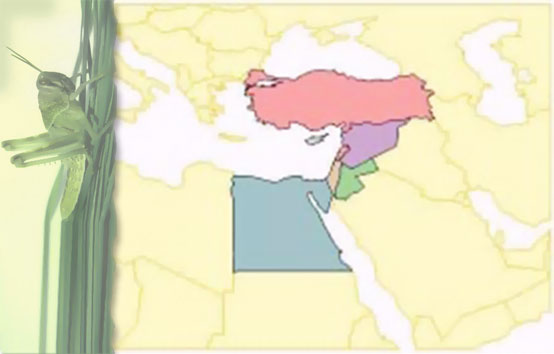Icerya purchasi Maskell
Taxonomic placing: Insecta, Hemimetabola, Hemiptera, Sternorrhyncha, Coccomorpha, Coccoidea, Monophlebidae.
Common name: Cottony-cushion scale, fluted scale.
Geographical distribution: This pest occurs wherever citrus is grown. It is of Australian origin and has invaded the Middle East in the early years of the 20th century. CIE Map #51, 1971 (revised).
Host plants: Cottony-cushion scale develops on many perennial shrubs and trees, being a pest mostly of citrus, occasionally of roses.
Morphology: The body of the female (and all other stages) is dark-red, 0.6-0.8 mm long, covered by white wax and carrying behind it a large, white striated ovisac. The legs and antennae are black. The ventral side of the body bears many wax glands. The rare male is also dark-red, with a single pair of wings and long antennae.
Life cycle: The hermaphroditic female lays her several hundred eggs, whose number depending on the season and the host plant, into its ovisac. The emerging crawlers settle nearby, mostly along branches and leaf veins. Shortly after settling they begin to secrete white wax, first as isolated plates and later as a total cover. The pest moves about throughout its life, preferring the inside of trees. There are three to four annual generations. Males are rare, usually appearing during very hot weather. Although they mate with the females, it is not clear whether they are functional. The scale may easily be mass-reared on citrus seedlings.
Economic importance: The pest sucks out plant sap, injects toxins and secretes much honeydew, which is colonized by sootymold fungi. Heavily infested trees may shed all their leaves and fruit, resulting in total yield loss and even death. The pest can destroy entire orchards. Affected trees appear to be black, due to the sooty mold, with white spots, the bodies of the scales.
Chemical control: The pest may be controlled with organophosphates or white oils. The insect growth regulator Buprofezin killed almost all crawlers and young nymphs; elder nymphs were less affected.
Biological control: This scale, accidentally introduced from Australia into the U.S.A. in the 1860s, became a destructive citrus pest until it was totally control by the vedalia beetle, [_Rodolia
cardinalis_](enemy/Rodolia_cardinalis) Mulsant Coccinellidae introduced from Australia in the 1880s. The pest invaded Israel around 1912, and was soon controlled by the vedalia, this control holding as long as the beetle is not harmed by pesticides, or affected by toxic secondary plant constituents moving from the pest to the beetle. The cryptochaetid endoparasitoid Cryptochaetum iceryae Williston was introduced into Egypt in 1902 and into Israel in the late 1980s in order to supplement the effect of the vedalia. The fly is established in Israel and is expected to contribute to the pest’s control in the cooler, more northerly parts of the region. The control of the cottony-cushion scale was the first outstanding example of the successful biological control of a pest by an introduced natural enemy.
References
Mendel, Z. and Blumberg, D. 1991. Colonization trials with Cryptochetum iceryae and Rodolia iceryae for improved biological control of Icerya purchasi in Israel. Biological Control 1: 68-74.
Mendel, Z., Blumberg, D. and Ishaaya, I. 1991. Effect of Buprofezin on Icerya purchasi and Planococcus citri. Phytoparasitica 19: 103-112.
Quezada, J.R. and DeBach, P. 1973. Bioecological studies of the cottony cushion scale, Icerya purchasi Mask., and its natural enemies _Rodolia
cardinalis_ Mul. and Cryptochetum iceryae Will., in southern California. Hilgardia 41: 631-688.
Ragab, M.E. 1995. Adaptation of Rodolia cardinalis (Mulsant) (Col., Coccinellidae) to Icerya aegyptiaca (Douglas) (Hom., Margrodidae) as compared with Icerya purchasi Mask. Journal of Applied Entomology 119: 621–623.
Rivnay, E. 1968. Biological control of pests in Israel (a review 1905-1965). Israel Journal of Entomology 3: 1-156.
Website
